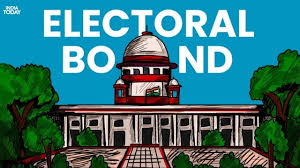Ahmedabad
(Head Office)Address : 506, 3rd EYE THREE (III), Opp. Induben Khakhrawala, Girish Cold Drink Cross Road, CG Road, Navrangpura, Ahmedabad, 380009.
Mobile : 8469231587 / 9586028957
Telephone : 079-40098991
E-mail: dics.upsc@gmail.com

Electoral Bonds Scheme
News: The electoral Bonds scheme was held as “unconstitutional” in a unanimous judgment by the five-judge bench of Supreme Court (SC) headed by the CJI.
What are Electoral Bonds?
• “Electoral bonds” are interest-free “bearer instruments”, which means that they are payable to the bearer on demand, similar to a promissory note.
Who is eligible to buy these bonds?
• Any citizen of India or entities incorporated or established in India can purchase these Bonds.
Which political parties are eligible to receive electoral bonds?
• Only political parties registered under Section 29A of the Representation of the People Act, 1951 and which secured not less than 1% of votes polled in the last general election to the House of the People or the Legislative Assembly of the State, are eligible to receive electoral bonds.
How does the entire process work?
• The State Bank of India (SBI) issues electoral bonds in the months of January, April, July and October.
• The electoral bonds are available in denominations from Rs 1,000 to Rs 1 crore.
• The donors can buy electoral bonds and transfer them into the accounts of the political parties as a donation. The name of the donor is kept confidential.
• Political parties create a specific account. This account is verified by the ECI. The political parties encash the electoral bonds only in this verified account.
• The bonds remain valid for 15 days. Within that time, the political parties have to encash the electoral bond in the designated accounts.
On what grounds did the Supreme court of India strike down the Electoral Bonds scheme as unconstitutional?
Violation of Right to Information
• The court held that the scheme, by permitting anonymous political donations, infringed upon the fundamental right to information under Article 19 (1) (a) of the Constitution.
• It pointed out that such a right is not only restricted to fulfilling the freedom of speech and expression but plays a key role in furthering participatory democracy by holding the government accountable.
Economic Inequality
• The court highlighted the “deep association” between money and politics, and how economic inequality contributes to political inequality by increasing the possibility of quid pro quo arrangements for those with the ability to contribute larger amounts to political parties.
• These arrangements could result in favorable policy changes and government licenses which the voters have a right to know about.
Disproportionate Restrictions
• The court found that the restrictions imposed by the scheme are disproportionate to the stated goal of curbing the circulation of black money.
• By securing the anonymity of donors, the scheme was argued to replace cash donations with electoral bonds and thus greatly reduce the influence of black money in politics. However, the court disagreed with this argument.
Amendments to Key Laws
• The court also struck down the amendments made to key laws on electoral finance which were introduced in the lead up to the introduction of the Electoral Bonds Scheme.
What were the concerns with Electoral Bonds scheme?
• Anonymity of Donor: Prior to the introduction of electoral bonds, political parties had to disclose details of all its donors, who have donated more than Rs 20,000. However, electoral bonds scheme hides the details of donors and recipients thus compromise “Citizen’s right to know”.
• Non Transparent: The scheme was dubbed as “non-transparent”, which “opened doors to unlimited political donations, even from foreign companies,” thus legitimizing corruption on a large scale.
• Misuse of scheme: The then RBI Governor had raised concerns that issue of EBs as bearer instruments in current form contemplated the possibility of misuse, particularly through use of shell companies.
• Corporate Dominance: One of the main arguments for introduction of electoral bonds was to allow common people to easily fund political parties of their choice, but more than 90 of the bonds have been of the highest denomination (Rs 1 crore).
Way Forward
• A clean & transparent electoral funding process is important to ensure a fair electoral democracy. Several Developed nations in West have setup robust mechanisms to ensure transparency in their political systems.
• Elections should be a more level playing field so that good politicians, candidates and parties with less funds also stand a chance of competing in elections.

Address : 506, 3rd EYE THREE (III), Opp. Induben Khakhrawala, Girish Cold Drink Cross Road, CG Road, Navrangpura, Ahmedabad, 380009.
Mobile : 8469231587 / 9586028957
Telephone : 079-40098991
E-mail: dics.upsc@gmail.com
Address: A-306, The Landmark, Urjanagar-1, Opp. Spicy Street, Kudasan – Por Road, Kudasan, Gandhinagar – 382421
Mobile : 9723832444 / 9723932444
E-mail: dics.gnagar@gmail.com
Address: 2nd Floor, 9 Shivali Society, L&T Circle, opp. Ratri Bazar, Karelibaugh, Vadodara, 390018
Mobile : 9725692037 / 9725692054
E-mail: dics.vadodara@gmail.com
Address: 403, Raj Victoria, Opp. Pal Walkway, Near Galaxy Circle, Pal, Surat-394510
Mobile : 8401031583 / 8401031587
E-mail: dics.surat@gmail.com
Address: 303,305 K 158 Complex Above Magson, Sindhubhavan Road Ahmedabad-380059
Mobile : 9974751177 / 8469231587
E-mail: dicssbr@gmail.com
Address: 57/17, 2nd Floor, Old Rajinder Nagar Market, Bada Bazaar Marg, Delhi-60
Mobile : 9104830862 / 9104830865
E-mail: dics.newdelhi@gmail.com